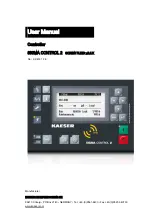
5
motor’s speed, and is especially useful at low speeds when the model is on the
ground - and only functions when the main throttle stick is below 50% full throttle.
When using a combustion engine use the throttle trim to precisely determine the
engine’s preferred idle point.
REVERSING SWITCHES:
A reverse switch is included for each channel.
Changing the position of a reversing switch changes the direction of movement
for that respective channel. Moving the position of the reversing switch can often
be the easiest way to alter the direction of a servo’s movement aside from making
mechanical changes in the model. Refer to the transmitter’s faceplate to properly
identify the different reversing switches. See the model’s instructions for specifi c
details relating to operation of the model.
TRAINER FUNCTIONS
The Tower Hobbies 424 radio includes a wireless trainer function. This radio can
also be connected by wireless means to another Tower Hobbies 424 transmitter or
Tactic
™
brand transmitter having the wireless trainer function for the purpose of
teaching a student how to fl y. It’s not possible to connect this radio to other brand
radios for wireless training. This radio can be used either by the teacher or student.
IMPORTANT!
Before operating a model in training situations make
sure the reverse settings and trim adjustments for all channels match
on both the teacher and student’s transmitters. Failure to do this could
cause the model to suddenly veer in an unexpected manner when the teacher’s
trainer switch is activated. Proper matching of settings is especially important for
the throttle channel!
1. Link the radio being used by the teacher to the receiver inside the model. Then
turn the receiver’s power switch off.
2. Move the throttle stick for both the teacher and student’s transmitter to the idle
position. Locate both the teacher and student’s transmitter within 1 meter of
each other.
3. Turn the student’s transmitter power switch ON.
4. Pull and hold the trainer switch on the teacher’s transmitter. Then, turn the
teacher’s power switch ON.
5. Observe the LED on the teacher’s transmitter. If it fl ashes three times the
teacher’s transmitter has linked to the student’s transmitter.
6. Release the trainer switch on the teacher’s transmitter.
7. After the transmitters are linked, power can be applied to the receiver inside
the model and confi rm the teacher has full control of the aircraft. Make sure
both transmitters are kept within 15 feet of each other at all times while training.
8. During fl ight, pulling and holding the teacher’s trainer switch will transfer control
of the model to the student. Control of the model can be returned immediately
to the teacher by releasing the trainer switch.
9. After the model is back on the ground and the training session has ended and
power is safely removed from the model, turn OFF the power switch of both
transmitters. This will break the wireless link between the transmitters. Return
to step 1 above to re-establish the wireless link for additional training.
Summary of Contents for 424
Page 16: ...16 ...

































